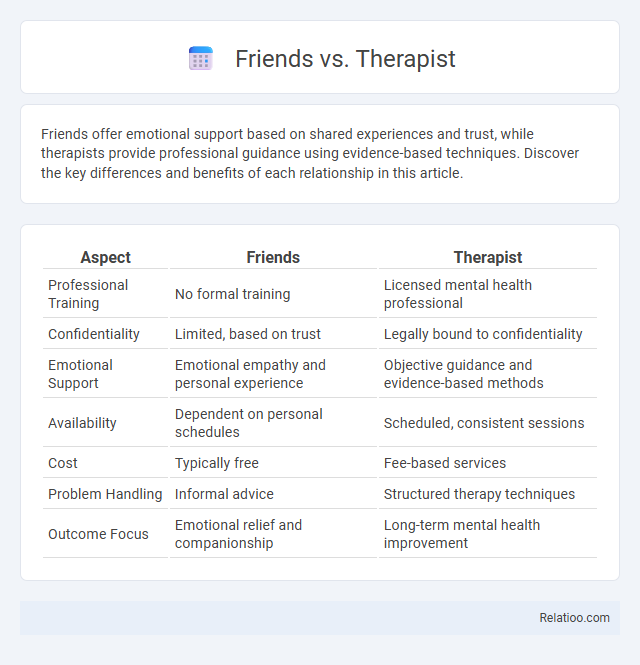Friends offer emotional support based on shared experiences and trust, while therapists provide professional guidance using evidence-based techniques. Discover the key differences and benefits of each relationship in this article.
Table of Comparison
| Aspect | Friends | Therapist |
|---|---|---|
| Professional Training | No formal training | Licensed mental health professional |
| Confidentiality | Limited, based on trust | Legally bound to confidentiality |
| Emotional Support | Emotional empathy and personal experience | Objective guidance and evidence-based methods |
| Availability | Dependent on personal schedules | Scheduled, consistent sessions |
| Cost | Typically free | Fee-based services |
| Problem Handling | Informal advice | Structured therapy techniques |
| Outcome Focus | Emotional relief and companionship | Long-term mental health improvement |
Understanding the Role of a Friend vs. a Therapist
Friends offer emotional support and companionship based on shared experiences and mutual trust, helping you navigate daily challenges through empathy and personal connection. Therapists provide professional guidance using psychological expertise and evidence-based techniques to address deeper mental health issues and promote long-term healing. Understanding the role of a friend versus a therapist enables you to seek the appropriate support for your specific emotional or psychological needs.
Emotional Support: Friends and Professionals Compared
Friends offer emotional support through shared experiences and empathy, creating a sense of belonging and understanding. Therapists provide professional guidance with evidence-based techniques, helping individuals develop coping strategies and address deeper psychological issues. While friends offer immediate comfort, therapists deliver structured support aimed at long-term emotional health.
Confidentiality: How Trust Differs
Therapists are bound by strict confidentiality laws, ensuring that personal information shared remains private except in cases of risk or harm. Friends may offer empathy and support but lack professional confidentiality guarantees, which can limit openness. Trust with therapists often allows for deeper disclosure due to their ethical obligations, while trust among friends depends on personal boundaries and individual discretion.
Training and Expertise: Therapists vs. Everyday Advice
Therapists undergo extensive training, including advanced degrees and supervised clinical hours, to provide evidence-based mental health care, while friends rely on personal experience and empathy without formal expertise. Your mental well-being benefits from a therapist's professional skills in diagnosing and treating psychological issues, whereas friends can offer emotional support and everyday advice rooted in familiarity and trust. Recognizing the difference in training ensures you seek the appropriate guidance for complex emotional challenges versus casual support.
Boundaries in Friendships and Therapy Sessions
Friends offer emotional support based on personal experiences, but their boundaries are often informal and may blur during conflicts or intense emotions. Therapists maintain strict professional boundaries, ensuring confidentiality and objectivity to promote a safe space for clients' mental health exploration. Clear boundaries in friendships prevent codependency, while in therapy, boundaries protect both parties and enhance effective treatment outcomes.
When to Seek a Therapist Instead of a Friend
You should seek a therapist instead of a friend when facing persistent mental health challenges that require professional intervention, such as anxiety, depression, or trauma. Therapists provide evidence-based strategies and a confidential, neutral space that friends may not offer. Friends offer emotional support and empathy but lack the clinical training necessary for diagnosing and treating psychological conditions.
The Impact of Bias: Objectivity in Guidance
Friends often provide emotional support but can exhibit bias due to personal involvement, potentially skewing advice. Therapists maintain objectivity through professional training and ethical guidelines, ensuring guidance is evidence-based and tailored to individual needs. Unlike friends, therapists actively mitigate bias, fostering clearer insight and more effective decision-making strategies.
Cost and Accessibility: Friends vs. Professional Help
Friends provide free, readily accessible emotional support without financial burden or appointment scheduling, making them an immediate resource during crises. Professional therapists require payment, with costs varying widely based on credentials, location, and session length, but offer structured, evidence-based interventions and confidentiality. Accessibility to therapists can be limited by insurance coverage, provider availability, and geographic location, while friends are typically more consistently reachable but may lack specialized training for complex mental health issues.
Emotional Burden: Strain on Friendships
Confiding in friends about emotional struggles can sometimes cause strain as they may feel overwhelmed by the weight of your issues, leading to unintentional emotional burden. Therapists are trained to manage and process these feelings professionally, ensuring your emotional support system remains healthy and sustainable. Balancing openness with boundaries helps protect your friendships from fatigue and preserves mutual trust.
Integrating Both: Friends and Therapists for Holistic Well-being
Integrating both friends and therapists fosters holistic well-being by combining emotional support from personal relationships with professional guidance tailored to mental health needs. Friends offer empathy and shared experiences that create a sense of belonging, while therapists provide evidence-based strategies and objective insights for personal growth. Utilizing both resources enhances resilience, emotional balance, and overall psychological wellness.

Infographic: Friends vs Therapist
 relatioo.com
relatioo.com